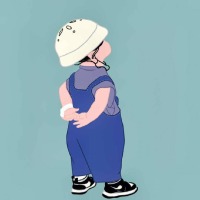 阿啵呲嘚
阿啵呲嘚-
bad的比较级:worse 最高级:worst
词汇解析
bad
英[bæd];美[bæd]
adj. 坏的;严重的;劣质的
n. 坏事;坏人
adv. 很,非常;坏地;邪恶地
n. (Bad)人名;(罗)巴德
例:The floods are described as the worst in nearly fifty years.
这场洪水被描述为近五十年来最严重的一次。
例:The bad weather conditions prevented the plane from landing.
恶劣的天气使飞机无法着陆。

扩展资料
一、bad的用法
1、bad的基本意思是“坏的,邪恶的,不道德的”,也可作“令人不快的,使人讨厌的”。
2、bad在句中可用作定语或表语。
3、bad和feel, seem, look等词连用,意为“不舒服”。
4、bad的比较级为worse,最高级为worst。
5、bad一般不用于否定句中,习语not bad的意思是“不错”。
二、关于bad的短语
1、bad luck 运气不好,坏运气
2、bad thing 坏东西, 坏事
3、bad habit 坏习惯
4、go bad 变酸;开始腐坏
5、bad mood 坏心情,坏情绪
6、bad influence 坏影响
 max笔记
max笔记-
形容词的比较级和最高级:
绝大多数形容词有三种形式,原级,比较级和最高级, 以表示形容词说明的性质在程度上的不同。
形容词的原级: 形容词的原级形式就是词典中出现的形容词的原形。 例如: poor tall great glad bad
形容词的比较级和最高级: 形容词的比较级和最高级形式是在形容词的原级形式的基础上变化的。 分为规则变化和不规则变化。
规则变化如下:
1) 单音节形容词的比较级和最高级形式是在词尾加 -er 和 -est 构成。
great (原级) greater(比较级) greatest(最高级)
2) 以 -e 结尾的单音节形容词的比较级和最高级是在词尾加 -r 和 -st 构成。
3)少数以-y, -er, -ow, -ble结尾的双音节形容词的比较级和最高级是在词尾加 -er 和 -est 构成。
clever(原级) cleverer(比较级) cleverest(最高级)
4) 以 -y 结尾,但 -y 前是辅音字母的形容词的比较级和最高级是把 -y 去掉,加上 -ier 和-est 构成.
happy (原形) happier (比较级) happiest (最高级)
5) 以一个辅音字母结尾其前面的元音字母发短元音的形容词的比较级和最高级是双写该辅音字母然后再加 -er和-est。
big (原级) bigger (比较级) biggest (最高级)
) 双音节和多音节形容词的比较级和最高级需用more 和 most 加在形容词前面来构成。
beautiful (原级)? difficult (原级)
more beautiful (比较级) more difficult (比较级)
常用的不规则变化的形容词的比较级和最高级:
原级 比较级 最高级
good better best
many more most
much more most
little less least
ill worse worst
far farther(further) farthest(furthest)
形容词前如加 less 和 lest 则表示"较不"和"最不"
important 重要
less important 较不重要
lest important 最不重要
形容词比较级的用法:
形容词的比较级用于两个人或事物的比较,其结构形式如下:
主语+谓语(系动词)+ 形容词比较级+than+ 对比成分。 也就是, 含有形容词比较级的主句+than+从句。注意从句常常省去意义上和主句相同的部分, 而只剩下对比的成分。
It is warmer today than it was yesterday.
今天的天气比昨天暖和。
This picture is more beautiful than that one.
这张照片比那张照片漂亮。
The sun is much bigger than the moon.
太阳比月亮大得多。
"The+形容词比较级..., the+形容词比较级..."表示 " 越... 就越..."。 he more you study, the more you know.
你学的越多, 就知道的越多。
The more I have, the more I want.
我越有就越想要有。
The more, the better.
越多越好。
形容词比较级 + and + 形容词比较级 ", 表示 " 越来越... "。
It"s getting hotter and hotter.
天气越来越热了.
The more and more people focus on the meeting next year.
越来越多的人关注明年的会议。
主语+谓语(系动词)+as+形容词原形+as+从句。表示两者对比相同。
This box is as big as mine.
这个盒子和我的一样大。
This coat is as cheap as that one.
这件衣服同那件衣服一样便宜。
I study English as hard as my brother.
我同我兄弟一样学习努力。
the + 形容词 表示某种人。
He always helps the poor.
他经常帮助穷人。
I like to have a talk with the young.
我喜欢同年轻人谈话。
The rich sometimes complain their empty life.
富人有时抱怨他们空虚的生活。
The police led the old man across the street.
警察领老人横过马路。 英语语法-副词
副 词 的 定 义:
副词是一种用来修饰动词,形容词,副词或全句的词,说明时间,地点,程度,方式等概念。
副 词 的 分 类:
1) 时间和频度副词:
now,then,often,always,usually,early,today, lately, next,last,already,generally,frequently, seldom,ever,never,yet,soon,too, immediately, hardly,finally,shortly, before, ago,sometimes, yesterday.
2) 地点副词:
here, there, everywhere, anywhere, in, out, inside, outside, above, below, down, back, forward, home, upstairs, downstairs, across, along, round , around, near, off, past, up, away, on.
3) 方式副词:
carefully, properly, anxiously, suddenly, normally, fast, well, calmly, politely, proudly, softly, warmly
4) 程度副词:
much,little, very,rather,so,too,still, quite, perfectly, enough, extremely, entirely,almost, slightly.
5) 疑问副词:
how, when, where, why.
6) 关系副词:
when, where, why.
7) 连接副词:
how, when, where, why, whether.
副 词 的 用 法:
副词在句中可作状语,表语,短语。
He works hard.
他工作努力。
You speak English quite well.
你英语讲的很好。
Is she in ?
她在家吗?
Let"s be out.
让我们出去吧。
Food here is hard to get.
这儿很难弄到食物。
副 词 的 位 置:
1) 多数副词都可以放在动词的后面,如果动词带有宾语,副词就放在宾语后面。
I get up early in the morning everyday.
我每天早早起床。
He gave me a gift yesterday.
他昨天给了我一件礼物。
She didn"t drink water enough.
她没喝够水。
The train goes fast.
火车跑得快。
We can go to this school freely.
我们可以免费到这家学校学习。
They left a life hardly then.
当时他们的生活很艰难。
He has a new cat on today.
他今天戴了一顶新帽子。
I have seen this film twice with my friends.
这部电影我和朋友看过两次。
2) 副词修饰形容词,副词时,副词在前面,而被修饰的词在后面。
It"s rather easy, I can do it.
这很容易,我能做到。
He did it quite well.
他做得相当好。
It"s rather difficult to tell who is right.
很难说谁是对的。
It"s so important that I must tell my friends.
这件事太重要了,我得告诉我的朋友。
It"s much better.
好多了。
3) 频度副词可放在实义动词的前面,情态动词和助动词的后面。
I often help him these days.
这些日子我经常帮助他。
I always remember the day when I first came
to this school.
我常常记得我第一次来学校的那一天。
You mustn"t always help me.
你不能老是帮助我。
He seldom comes to see us.
他很少来看我们。
We usually go shopping once a week.
我们通常一周买一次东西。
The new students don"t always go to dance.
新学生并不时常去跳舞。
4) 疑问副词,连接副词,关系副词以及修饰整个句子的副词,通常放在句子或从句的前面。
When do you study everyday?
你每天什么时间学习?
Can you tell me how you did it?
你能告诉我你如何做的吗?
First, let me ask you some questions.
先让我来问几个问题。
How much does this bike cost?
这辆车子多少钱?
Either you go or he comes.
不是你去就是他来。
The students were reading when the teacher came into the classroom.
当老师进教室时,学生们正在读书。
5) 时间副词和地点副词在一个句中, 地点副词在前面时间副词在后面。
We went shopping in the supermarket at 9 o"clock yesterday.
昨天九点钟我们到超市买东西了.
What were you doing in the classroom yesterday evening?
昨天下午你在教室里干什么?
The accident took place one hour ago in the Eleven Avenue.
一小时前十一号大街发生了一场事故。
副 词 的 比 较 等 级:
副词和形容词一样,也有它的比较级和最高级形式. 可以参考形容词的变换形式。但以词尾 -ly 结尾的副词(除 early )须用 more 和 most 。
hard harder hardest
fast faster fastest
early earlier earliest
much more most
warmly more warmly most warmly
单音节副词的比较级是在副词后面加上 -er 构成的,最高级是在副词后面加上 -est 构成的。
near nearer nearest
hard harder hardest
多音节副词的比较级是在副词的前面加上 -more 构成的。 最高级是在副词前面加上 -most 构成的。
warmly more warmly most warmly
successfully more successfully most successfully
有些副词的比较级和最高级形式是不规则的。
well-better - best little - less - least
Much- more - most badly - worse - worst
far-farther(further)-farthest(furthest)
副词的比较级和最高级用法同形容词的比较级用法基本一样。 最高级形式句中 the 可以省略。
He works harder than I.
他比我工作努力。
Lucy gets up earlier than Lili.
露西比丽丽起床早。
He runs fastest in our class.
他在我们班跑地最快。
He dives deeper than his teammates.
It"s true that he speak English more fluently than any of us. Our school team play football best in our region.
副词的用法:
形容词和副词形容词和副词在语法结构中主要用于比较级和最高级。形容词和副词的构成形式基本上一样,它们的形式与单音节、双音节和多音节有关,当然还有其特殊形式。形容词和副词比较级的基本用法分为同级比较、比较级和最高级三种形式。但这三种形式都有它们特殊的表达方式以及它们的惯用法。对以下要点大家须一一掌握。
第一节 形容词比较级和最高级的形式
一、形容词比较级和最高级的构成
形容词的比较级和最高级变化形式规则如下
构 成 法 原 级 比 较 级 最 高 级
① 一般单音节词末尾加�er 和 �est strong stronger strongest
② 单音节词如果以�e结尾,只加�r 和�st strange stranger strangest
③ 闭音节单音节词如末尾只有 一个辅音字母,
须先双写这个辅音字母,再加�er和�est sad
big
hot sadder
bigger
hotter saddest
biggest
hottest
④ 少数以�y,�er(或�ure),�ow,�ble结尾的双音节词,
末尾加�er和�est(以�y结尾的词,如�y前是辅音字母,
把y变成i,再加�er和�est,以�e结尾的词仍
只加�r和�st) angry
clever
narrow
noble angrier
⑤ 其他双音节和多音节词都在前面加单词more和most different more
different most
1) The most high 〔A〕 mountain in 〔B〕 the world is Mount Everest, which is situated 〔C〕 in Nepal and is
twenty�nine thousand one hundred and fourty one feet high 〔D〕 .
2) This house is spaciouser 〔A〕 than that 〔B〕 white 〔C〕 one I bought in Rapid City, South Dakota 〔D〕 last year.
3) Research in the social 〔A〕 sciences often proves difficulter 〔B〕 than similar 〔C〕 work in the physical 〔D〕 sciences.
二、形容词比较级或最高级的特殊形式:
1. 三个或三个以上音节的形容词只能加more和most
只能说 more beautiful而不能说beautifuller; 只能说the most beautiful而不能说beautifullest。
但是,以形容前缀�un结尾的三音节形容词不适合上述情况,如unhappy,untidy,我们可以说:unhappier→unhappiest, untidier→untidiest
2. 由�ING分词和�ED分词演变过来的形容词(包括不规则动词如know→known)只能加more或most来表示它们的比较级和最高级
more(most) striking, more(most) interesting, more(most) wounded, more(most)worn等。
4) The drawings 〔A〕 of the old masters 〔B〕 are among the treasuredest 〔C〕 works in museums 〔D〕 .
3. 英语里有些形容词由于其词义而不可能有比较级形式
absolute fatal main right universal
chief final naked simulta- utter
entire foremost perfect neous vital
eternal inevitable possible sufficient whole
excellent infinite primary supreme wooden
三、不规则形容词的比较级和最高级形式
good
well better best
bad
ill worse worst
many
much more most
little
few less least
far farther farthest
further furthest
5) African elephants are larger, fiercer, and difficulter 〔A〕 to tame 〔B〕 than 〔C〕 Asian elephants 〔D〕 .
6) Sarah Hale became 〔A〕 one of the famousest 〔B〕 magazine 〔C〕 editors in the United States during 〔D〕 the 1800"s.
7) Of all 〔A〕 the Native American tribes 〔B〕 , the Shawnee Indians were 〔C〕 a most 〔D〕 transient.
四、例题解析
1) A错。应将“most high”改为highest。这是在考形容词比较级的构成形式。
2) A错。改为more spacious。
3) B错。 改为more difficult。
4) C错。 treasured 在本句中是�ED分词(动词treasure +ed)作形容词使用,是“宝贵的、珍贵的”意思,修饰名词 works(作品),其最高级形式应用 the most treasured。
5) A错,改为more difficult。
6) B错。改为“the most famous”,因为famous(著名的)是双音节,其最高级变化应在前面加“the most”。
7) D错。应改为“the most”,因为此处表示的是最高级,“the most transient”意为“(延续时间)最短暂的”。
第二节 副词比较级和最高级的形式
副词比较级和最高级的变化形式与形容词基本上一样
一般 副词
hard→harder →hardest
fast→faster →fastest
late→later →latest
early→earlier →earliest
特殊 副词
well →better →best
much →more →most
badly →worse →worst
little →less →least 但是,开放类副词即以后缀�ly结尾的副词不能像形容词那样加�er或�est,如
quickly →more quickly →most quickly quietly →more quietly →most quietly
〔注〕: early中的�ly不是后缀,故可以把�y变�i再加�er和�est
第三节 形容词与副词比较级和最高级的基本用法
一、原级比较的基本用法
1. 原级比较由“as+形容词或副词(或再加名词或短语)+as ”构成“原级相同”比较句,表示两者比较;其否定式,即“程度不及”比较句型为“not so(as) +形容词或副词+as”,而且as…as结构前可用just, almost, nearly, quite等表示程度的词修饰
1) Walking briskly for thirty minutes will burn as many calories as .
〔A〕 to run for fifteen minutes
〔B〕 running for fifteen minutes
〔C〕 you run for fifteen minutes
〔D〕 fifteen�minute walking
2) The gorilla(大猩猩), while 〔A〕 not quite as curious than 〔B〕 the chimpanzee(黑猩猩), shows more persistence 〔C〕 and memory retention(记忆力) in solving 〔D〕 a problem.
3) Alaska is twice 〔A〕 as larger 〔B〕 as 〔C〕 the next largest 〔D〕 state, Texas.
2. “as (so)+名词+as+名词”进行名词比较,这时一般情况下有一个表示原级的比较词,但如果第一名词前出现了形容词修饰该词或出现副词修饰谓语,应当用so而不用as
4) Thomas Jefferson"s achievements as an architect rival his contributions a politician.
〔A〕 such
〔B〕 more
〔C〕 as
〔D〕 than
5) I should say Henry is not much a writer as a reporter. (88年考题)
〔A〕 that
〔B〕 so
〔C〕 this
〔D〕 as
二、比较级
1. 比较级由“形容词(副词)比较级+than+…,”构成表示在两者中间一方比另一方“更加…”。连词than后可接句子,也可接名词、代词、名词短语、介词短语、动词、动词不定式、�ING结构和�ED结构,有时也可省去than。
6) Natural mica(云母) of 〔A〕 a superior 〔B〕 quality is cheapest 〔C〕 to obtain than synthetic 〔D〕 mica.
7) She is older than .
〔A〕 any other girl in the group
〔B〕 any girl in the group
〔C〕 all girls in the group
〔D〕 you and me as well as the group
8) Josephine McCrackin joined 〔A〕 the “Santa Cruz Sentinel” in 1905 and, until her death fifteen years late 〔B〕 , remained 〔C〕 active in journalistic 〔D〕 work.
2. 注意than前后两项相比较的人或事物要一致
9) The purpose of the research had a more important meaning for them than .
〔A〕 ours
〔B〕 with us
〔C〕 for ours it had
〔D〕 it did for us
10) Sound travels air.
〔A〕 faster through water than through 〔B〕 faster than through water and
〔C〕 through water faster and〔D〕 where it is faster through water than through
11) Gerbrand von den Feckhout, one of Rembrand"s pupils, followed 〔A〕 the style of his teacher so implicitly that 〔B〕 his paintings 〔C〕 are sometimes confused with his master 〔D〕 .
三、最高级
1. 最高级用于三者以上比较,形容词的结构形式是“定冠词+形容词最高级+名词+表示范围的短语或从句”(如all, of all, of the tree, in the world, that has ever taken place等)
12) The more 〔A〕 fearsome of all the 〔B〕 animals in 〔C〕 the Western 〔D〕 Hemisphere is the grizzly bear.
13) Of all economic 〔A〕 problems, inflation continues to be 〔B〕 a 〔C〕 most significant in its daily impact on 〔D〕 people and business.
14) , the most familiar to general public is the criminal jurisdiction.
〔A〕 All the activities
〔B〕 The activities
〔C〕 Of all the activities
〔D〕 It is the activities
2. 副词的最高级与形容词最高级的区别在于最高级前没有定冠词the
四、例题解析
1) B为正确答案。
2) B错。改为 as ,和前面的as和形容词原形curious 一起构成同程度比较。
3) B错。 改为as large。
4) C对。动词rival(胜过、匹敌)前后是两个相比较的成分achievements(成果)和 contributions(贡献),由于前面的名词后出现了短语 as an architect,故空白处也应用as,使前后对比成分一致。
5) B为正确答案。
6) C错。应改为比较级cheaper。比较级后并不一定跟接连词than,有时在其间有名词或名词短语(被形容词所修饰),介词短语,不定式或其他成分隔开。
7) A为正确答案。“She”作为单个不能跟全组比(C和D不对),也不能跟全组所有相比,因为“她”也是其中一员,自然“她”不能跟自己相比。这里“S S笔记
S笔记-
比较级WORSE
最高级WORST
副词BADLY的也是如此
 LuckySXyd
LuckySXyd-
bad的比较级和最高级分别是 worse 和 worst
 左迁
左迁-
worse
[英][wɜ:s][美][wɚs]
adj.更坏的;
恶化的;
更厉害的;
严重的(
bad,ill,badly的比较级);
adv.更坏地,更糟地;
(程度上)更…;
n.更坏的事物
worst
[英][wɜ:st][美][wɚst]
adj.最差的;
最严重的;
最令人不满的;
“bad“以及“ill“的最高级;
n.最坏的事情;
无论怎样坏;
同“at
one%27s
worst.
at
one%27s
worst”;
adv.最坏地;
〈习语〉极度;
“badly“的最高级;
vt.胜过,击败
